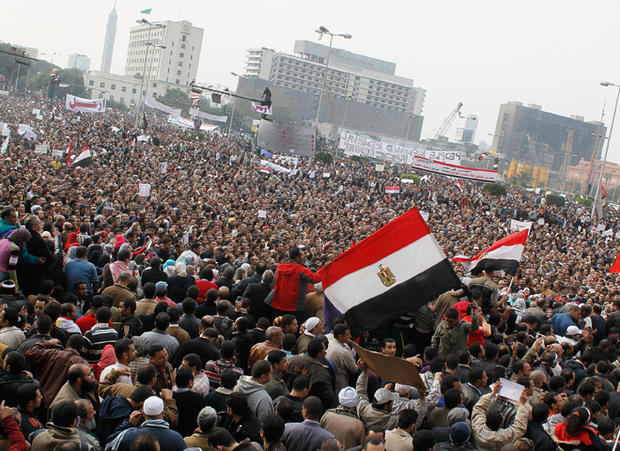Muslim Brotherhood: We Don't Lead Egypt's Revolt
After Iran underwent a major popular revolution in 1979, a strict Islamic state emerged.
That is the major reason why so many are curious about the intentions of Egypt's Muslim Brotherhood, the country's largest opposition group, in both the current protests and whatever happens next.
For now, the Brotherhood has put up a moderate, restrained front that speaks more towards its nationalism than any religious fanaticism.
In an interview with CBS News correspondent Elizabeth Palmer, Brotherhood spokesman Dr. Mahmoud Ezzat said:
"No other group has ever suffered oppression, torture and rejection like the Muslim Brotherhood has during the 30 years of the Hosni Mubarak rule. We have always voiced our rejection of this criminal policy that has affected all aspects of life in Egypt, oppressed all those who have an opinion. The result is this image that we are honored to see today; the revolution of Egypt's youths, and we have taken part in it from the first moment until now."
Complete Coverage: Anger in the Arab World
Live Blog Day 8: Crisis in Egypt
A major concern of any potential post-Mubarak era in Egypt is how relations with Israel will be moving forward. Ezzat said they do not hold views similar to that of extremist groups like Hezbollah or Hamas, who seek to eradicate the Jewish state.
"We will respect the peace treaty with Israel as long as Israel shows real progress on improving the lot of the Palestinians," Ezzat said.
When asked whether the Brotherhood wanted peace with Israel, Ezzat said: "We want peace with all the world."
The Muslim Brotherhood has stated previously that it wants to form a state governed by Islamic law, but renounced violence during the 1970s, unlike other Islamist groups that waged a violent campaign against the government in the 1980s and 1990s. Regardless, the more secular members of Egypt's revolt say they are deeply suspicious the Brotherhood aims to co-opt what they contend is a spontaneous, popular movement. American officials have suggested they have similar fears.
In a nod to the suspicions, Brotherhood figures insist they are not seeking a leadership role.
In an interview with German news magazine Der Spiegel, Rashad al-Bayoumi, deputy head of the Muslim Brotherhood, said their wants are in line with all the demonstraters.
"We support (secular opposition figurehead Mohamed) ElBaradei's call for the end of Mubarak's regime. We support the demands of all in the opposition," Bayoumi said.
However, he stopped short of crowning the Nobel Peace Prize laureate as head of the opposition movement. "Nobody at the moment has the right to call himself the leader of this revolution," Bayoumi said. "Let's allow the people to decide."
The Brotherhood appeared to be caught flat-footed by the eruption of protests a week ago, fueled by young, more secular activists, and was slow to join in.
But once it did call out its membership, the result was that Alexandria, where the Brotherhood is centered, saw the largest protests - and the fiercest clashes with police - of any city in Egypt, with tens of thousands marching through the streets, a sign of its organizing prowess.
Still, though it can bring out the sheer numbers, the Brotherhood is reluctant to present itself overtly as a leader or driving force in the protests, realizing that storming out with its hard-line slogans of "Islam is the solution" would disillusion secular groups, raise panic that it is trying to take over and bring a harsher government crackdown.
